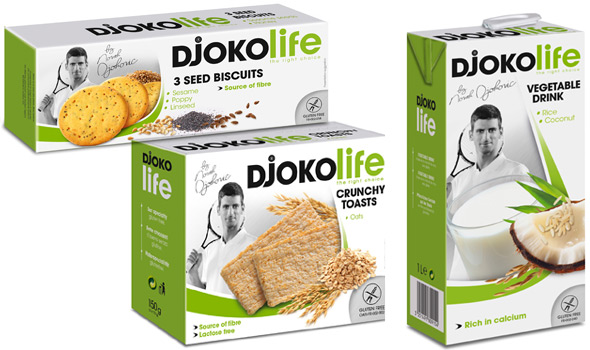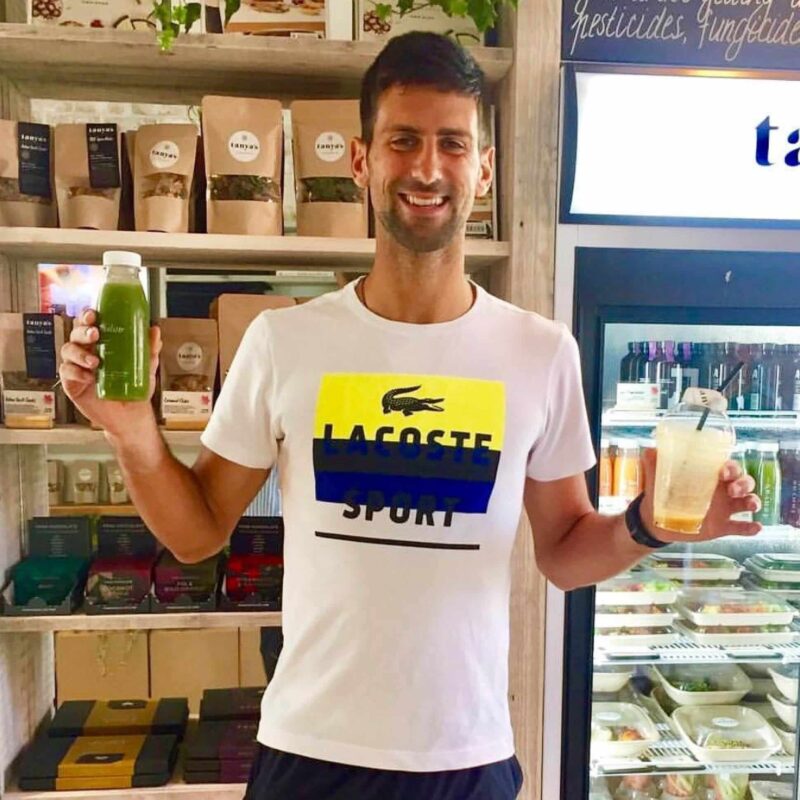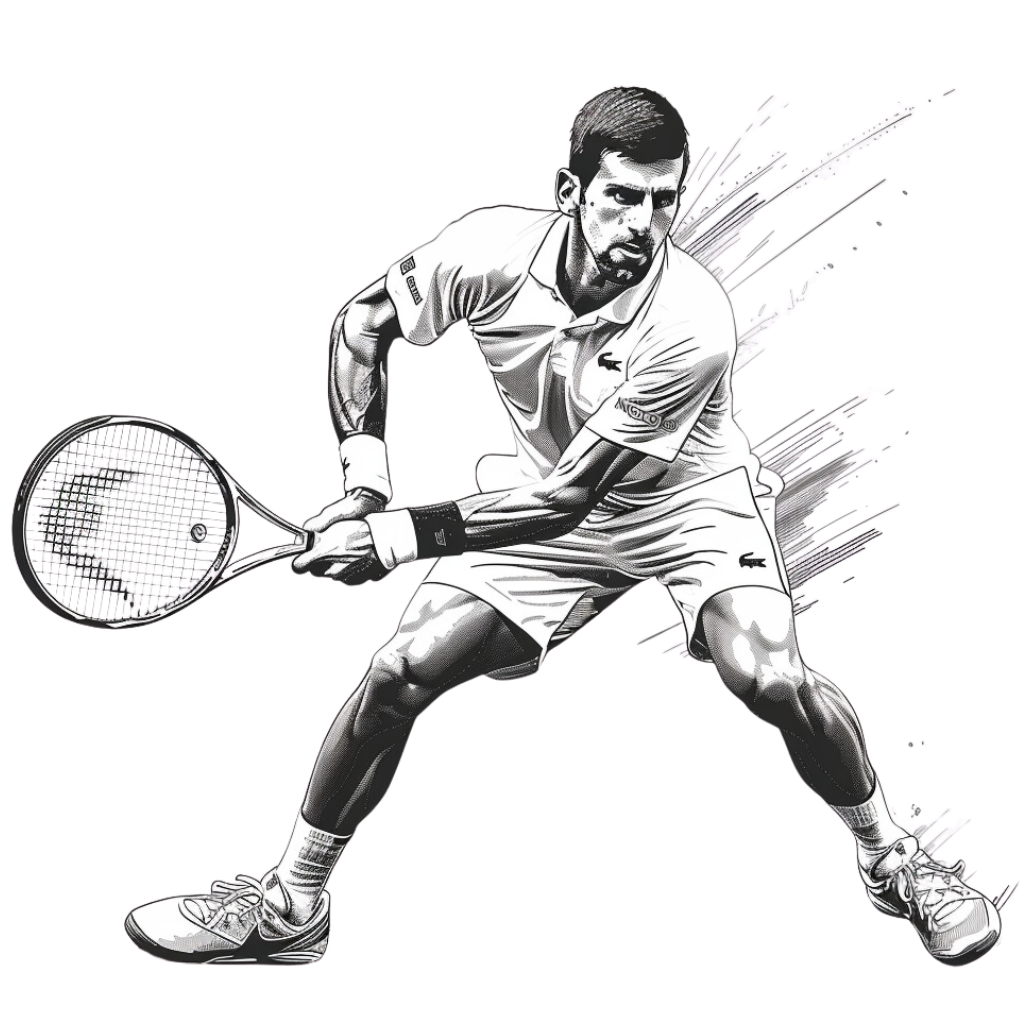He struggled on the courts for years, even though he trained 8 hours a day. From 2007 to 2010, he produced excellent results, but far from the best. He was tired, suffocating on the court, giving up matches. He was on the verge of quitting tennis. Then suddenly everything changed. That is, not everything, just nutrition. Novak Djokovic diet brought him a strengthened body, endurance in long matches.
He didn’t give up them anymore, he fought for 5, 6 hours, and then the next match even more. With the win at the end. And finally: he started regularly beating Federer and Nadal.
After all, that’s one of the reasons why he is so consistent, and with so many positive h2h scores against almost all players Novak ever faced.
Gluten-Free Diet
Novak Djokovic begins his day with a glass of warm water with lemon. This simple routine helps him detoxify his body and kick-starts his metabolism for the day.
In 2011 there was that guy Dr. Igor Cetojevic who really helped Novak Djokovic big time! He’s a Serbian nutritionist who used a special arm test to figure out that Novak was sensitive to gluten.

After Novak stopped eating gluten, Djokovic was virtually unbeatable. Leaner, faster and fresher, he won three majors, and 70 matches in all while losing only six. Djokovic beat Rafael Nadal in a five-hour, 53-minute slugfest in the Australian Open final.
I look at Nolet the same as all my patients whom I have helped to find their way in life and to be healthy above all. Nole, unlike the others, is a media-recognizable and popular sports personality, who applied my medical knowledge, which improved his health, and later his sports performance – said once Dr. Igor Cetojevic
More plant-based food
He drinks celery juice on an empty stomach, which is believed to aid in digestion, reduce inflammation, and provide a significant nutrient boost.
The doctor’s advice set Novak up to eat healthy for the long run, including going more plant-based. This change has really paid off – it’s been a big part of Novak’s success and overall well-being.
One of the most transformative dietary changes Djokovic made was adopting a gluten-free diet. For years, he struggled with respiratory issues, fatigue, and inconsistent performance on the court. After being diagnosed with gluten sensitivity in 2010, he eliminated gluten from his diet. The results were almost immediate and profound.
His energy levels increased, and he no longer experienced the debilitating fatigue that had plagued him for years. Djokovic credits this dietary change as a pivotal moment in his career, allowing him to compete at the highest levels without the physical limitations he once faced.
View this post on Instagram
The removal of gluten, a protein found in wheat and other grains, from his diet, eliminated a major source of inflammation and digestive issues. This change not only improved his digestion but also helped reduce inflammation throughout his body, which is crucial for recovery and performance in a physically demanding sport like tennis. By avoiding gluten, Djokovic was able to maintain a more consistent level of energy and focus, both on and off the court.
Cutting Out Dairy
Djokovic’s diet is predominantly plant-based. He emphasizes consuming a variety of fruits, vegetables, nuts, seeds, and legumes, which provide essential vitamins and minerals while reducing inflammation.
Eliminating dairy products from his diet was another crucial step in Djokovic’s nutrition transformation. Like gluten, dairy can be a source of inflammation and digestive issues for many people. For Djokovic, cutting out dairy helped improve his digestion, reduce mucus production, and enhance his respiratory health. This change has been particularly important for his endurance and stamina, as it has helped him avoid the respiratory issues that once limited his performance.
By avoiding dairy products, Djokovic reduced inflammation and improved gut health, which is necessary to maintain a high level of physical performance. This change in diet has also helped him achieve a more consistent level of energy and focus, both on and off the court. He raised the general health to the highest level, and the same level is his game. He destroyed opponents on the field.
Intermittent Fasting
He practices intermittent fasting, which involves cycling between periods of eating and fasting. This approach helps him maintain a lean body, improve metabolic health, and enhance mental clarity.
Intermittent fasting has been a key component of Djokovic’s dietary regimen. This approach involves alternating periods of eating and fasting, which can help improve metabolic health and increase energy levels. For Djokovic, intermittent fasting has helped him maintain a lean body composition, improve his mental clarity, and enhance his overall physical performance.
“I would like to touch on the topic of autophagy. How important is it, that type of fasting 16 – 8 is popular, 16 hours you don’t eat, 8 hours you eat, that’s what I apply, I’ve felt in the last year and a half that I’ve been practicing, a lot of improvement in the digestive system, I sleep better , I have more energy during the day, I have fewer of those falls,” Djokovic once said.
Intermittent fasting allows Djokovic to optimize his body’s natural rhythms and improve his digestion, both of which are crucial for maintaining a high level of physical performance. By embracing this approach, he has been able to reduce inflammation, improve his metabolic health, and enhance his overall well-being. This dietary change has been instrumental in helping him maintain his peak athletic performance and achieve his goals on the tennis court.
View this post on Instagram
Rules for Fasting – Who It Is (Not) For?
- The periods of food intake and non-intake are individual (it doesn’t have to be 16-8; 14 hours without food and 10 hours with food can also be effective. Try and modify according to your needs).
- During the eating period, what you eat is important.
- Avoid snacks and frequent nibbling. The point of intermittent fasting (IF) is to reduce the total number of meals during the day. So, instead of IF, you can try two meals a day (this also yields very good results in terms of cell sensitivity to insulin).
- Do not starve yourself – make sure you consume enough food.
- Do not overeat – too many calories, no matter the source, if not used up, end up as fat tissue.
It should be noted that there are certain categories of people for whom this type of diet is not recommended at all.
Intermittent Fasting is definitely not recommended for children, pregnant women, undernourished individuals, those who have or have had eating disorders, including binge eating disorder; of course, it is also not recommended for diabetics, patients suffering from Gilbert’s syndrome, and anyone who, due to health reasons, needs to have a constant, balanced source of energy.
Hydration and Electrolyte Balance
Djokovic’s diet is rich in antioxidants from a variety of colorful fruits and vegetables. Antioxidants help reduce oxidative stress, support recovery, and enhance overall health.
Maintaining proper hydration and electrolyte balance is crucial for any athlete, and Djokovic is no exception. He places a strong emphasis on staying hydrated and ensuring that his body has the right balance of electrolytes, which are essential for muscle function and overall health. By staying properly hydrated, Djokovic can maintain his energy levels, improve his focus, and reduce his risk of injury.
Djokovic’s approach to hydration involves drinking plenty of water and consuming electrolyte-rich foods and beverages. This approach helps him maintain a high level of physical performance and supports his overall health and well-being. By focusing on hydration and electrolyte balance, Djokovic has been able to enhance his endurance, improve his recovery times, and reduce his risk of injury, all of which are crucial for his success on the tennis court.
Limiting Sugar and Processed Foods
Novak Djokovic eat vegetables, beans, white meat, fish, fruit, nuts, seeds, chickpeas, lentils, and healthy oils are the main staples of Djokovic’s meal-times, with his day starting with a glass of warm water and lemon, citing that it ‘helps his body detoxify’.
Djokovic has also made a conscious effort to limit his intake of sugar and processed foods. These types of foods can lead to inflammation, energy crashes, and a variety of other health issues. By avoiding sugar and processed foods, Djokovic has been able to maintain a more stable level of energy and focus, both on and off the court.
By focusing on whole, unprocessed foods, Djokovic has been able to improve his overall health and well-being. This dietary approach has helped him maintain a lean body composition, reduce inflammation, and enhance his mental clarity, all of which are crucial for his success as an athlete. By limiting sugar and processed foods, Djokovic has been able to support his overall health and well-being, allowing him to compete at the highest levels of his sport.
Novak introduces DJOKOlife project
International law firm Withers has represented world number 1 tennis player Novak Djokovic on the development and launch of the new DJOKOlife range of nutrition products. DJOKOlife was launched today at an event attended by Novak, held at the headquarters of the Lombardy Region.
“During my 10-year career I had the chance to travel a lot and try different kinds of food, bread, snacks, energy and protein bars. Now, at last, I have found the diet that best suits me, that provides the tools for overcoming obstacles – both on and off the court – for finding the correct balance that makes me feel better. DJOKOlife offers a range of products that reflect my idea for a better lifestyle and diet. They are inspired by my personal experience and contain ingredients that are very carefully selected in accordance with the highest quality standards”, Novak stated.

DJOKOlife products are the result of precise scientific research and reflect Novak’s tastes and choices: rich in elements with highly nutritional benefits, they provide the correct quantities of fibre, vitamins, mineral salts and magnesium, the invaluable allies of your body’s wellbeing:
– 3 Seed Biscuits
– Crunchy Toasts with Rice Flour and Oats
– Honey and Sesame Seeds Bars
– Fruit and Cereal Bars
– Vegetable Drink
Novak Djokovic’s Three-Day Meal Plan
Day 1
- Breakfast:
- Warm water with lemon for detox.
- Celery juice on an empty stomach.
- Green smoothie with algae and fruit.
- Morning snack: Muesli with organic oats, cranberries, raisins, pumpkin seeds, sunflower seeds, and almonds.
- Lunch:
- Mixed green salad.
- Gluten-free pasta primavera with rice pasta, zucchini, asparagus, sun-dried tomatoes, and optional vegan cheese.
- Afternoon Snack:
- Apple with cashew butter.
- Melon.
- Dinner:
- Salad with avocado and homemade dressing.
- Carrot and ginger soup.
Day 2
- Breakfast:
- Water with two tablespoons of honey.
- Banana with cashew butter.
- Fruit.
- Mid-Morning Snack:
- Gluten-free toast with almond butter and honey.
- Lunch:
- Mixed green salad.
- Noodle salad with gluten-free noodles, red pepper, arugula, cashews, basil leaves, and balsamic vinegar.
- Afternoon Snack:
- Whole grain bars with fruit and nuts.
- Dinner:
- Green salad.
- Gluten-free pasta with powerful pesto made from rice pasta, walnuts, and basil leaves.
Day 3
- Breakfast:
- Warm water with lemon.
- Green smoothie with a mix of fruits and greens.
- Mid-Morning Snack:
- Homemade hummus with gluten-free chickpeas and soy sauce served with apples.
- Lunch:
- Green salad.
- Gluten-free pasta with rice pasta, basil pesto, and walnuts.
- Afternoon Snack:
- Avocado with gluten-free crackers.
- Fruit.
- Dinner:
- Salad with avocado and homemade dressing.
- Carrot and ginger soup.
Interesting Points About Djokovic’s Meal Plan
Day 1
- Morning Routine: Djokovic starts his day with a detoxifying glass of warm water with lemon, followed by nutrient-dense celery juice.
- Nutrient-Packed Breakfast: His muesli is a powerhouse of organic ingredients, including oats and a variety of seeds and nuts, providing essential nutrients and energy.
- Gluten-Free Focus: The lunch and dinner feature gluten-free pasta options, ensuring a light but fulfilling meal.
- Hydration and Detox: Emphasis on water intake and detoxifying foods like avocado and ginger, which support digestion and overall wellness.
Day 2
- Energy Boost: Breakfast includes honey for an immediate energy boost and bananas with cashew butter for sustained energy.
- Mid-Morning Sweet Treat: Gluten-free toast with almond butter and honey serves as a nutritious snack without causing a sugar crash.
- Balanced Lunch: Incorporates a variety of vegetables and gluten-free noodles to provide a balanced intake of vitamins, minerals, and carbohydrates.
- Nutrient-Dense Snacks: Whole grain bars with fruits and nuts offer a perfect blend of proteins, healthy fats, and fibers, ideal for a mid-day snack.
Day 3
- Consistent Hydration: Starts the day similarly to the first with warm water and a green smoothie to ensure hydration and nutrient intake.
- Protein-Rich Snack: Homemade hummus paired with apples offers a combination of plant-based proteins and fiber, making it a healthy and satisfying snack.
- Fresh and Organic: Lunch and dinner maintain a theme of fresh greens and organic ingredients, which are essential for sustained energy and good health.
- Anti-Inflammatory Choices: Ingredients like ginger and avocado, included in the soups and salads, are known for their anti-inflammatory properties, supporting overall wellness.
This meal plan highlights Djokovic’s commitment to a gluten-free, nutrient-dense diet that supports his high performance and overall health.
Djokovic’s Food Secrets
- Start the Day with Water
Novak Djokovic starts his day by drinking a tall glass of room-temperature water. He avoids ice water as it can slow digestion by requiring additional energy to warm up in the body.
- Eat Honey Daily
Every morning, Djokovic eats two spoonfuls of manuka honey. Despite being a sugar, it provides the necessary fructose without the crash associated with processed sugars.
- Power Bowl for Breakfast
For breakfast, Djokovic consumes a Power Bowl containing gluten-free muesli or oatmeal, mixed nuts, seeds, and fruits. He adds a small scoop of coconut oil for electrolytes and minerals, and uses rice milk, almond milk, or coconut water.
- Second Breakfast Option
On occasions where one bowl is not sufficient, he has a second breakfast comprising gluten-free toast, tuna, and avocado, which is one of his favorite foods.
- Carb-Packed Lunch
Djokovic’s lunch usually consists of gluten-free pasta made from quinoa or buckwheat, combined with a variety of vegetables like arugula, broccoli, and cauliflower, with olive oil and a bit of salt.
- Hydration During Workouts
During workouts, he drinks an energy drink with fructose extract and a hydration drink containing electrolytes. Post-practice, he consumes an organic protein shake with rice or pea protein concentrate.
- Snacks Between Matches
Before matches, Djokovic energizes with a power gel containing caffeine and eats dried fruits such as dates and a teaspoon or two of honey.
- Protein-Focused Dinner
For dinner, Djokovic opts for organic, grass-fed, or wild protein sources like steak, chicken, or salmon. He pairs these with steamed vegetables and sometimes legumes like chickpeas or lentils, or a soup.

Novak Djokovic Diet – Public Reaction
Novak likes to have a green smoothie packed with fruits including celery, apple juice, mint, spinach, and kale and while it might not sound too appetizing, it was very tasty.
A lot of folks are super impressed with how his plant-based eating has transformed his health. They’re saying they’ve had similar experiences – more energy, fewer allergies, the whole nine yards. Sounds like a pretty sweet deal, if you ask me. But then there are others who are a bit skeptical. They’re like, “Okay, but does this diet really work? Show me the science!” Guess they want to see the proof before they jump on board.
Still, there are plenty of people who find Novak’s commitment to his diet super inspiring. They’re even trying to adopt parts of it themselves, and they’re noticing some pretty cool changes in their own health and fitness. Got to respect that, you know?
Of course, there are some practical concerns too. Like, how do you make sure you’re getting enough protein on a plant-based diet? And what about when you’re out with friends and family – how do you handle that? Lots of questions, for sure. But you know what’s really interesting? A bunch of folks are talking on social media about the environmental benefits of Novak’s diet. They’re saying it’s way more sustainable, which is pretty awesome.
All in all, it’s a mixed bag of reactions. Some people are totally on board, others are a bit skeptical, but it’s clear that Novak’s dietary works for him. Prove? By changing his diet in 2011 he achieved the best possible results and became the GOAT!
Conclusion
Novak Djokovic diet changes have made him one of the best tennis players ever. He stopped eating gluten, dairy, and processed foods and switched to mostly plants. These changes helped him stay healthy and strong. He also drinks lots of water, practices intermittent fasting, and avoids sugar.
These habits keep his energy high and his mind clear. Djokovic’s success shows that eating the right foods can make a big difference in how you feel and perform. Whether you play sports or just want to feel better, eating like Djokovic might help you too.


